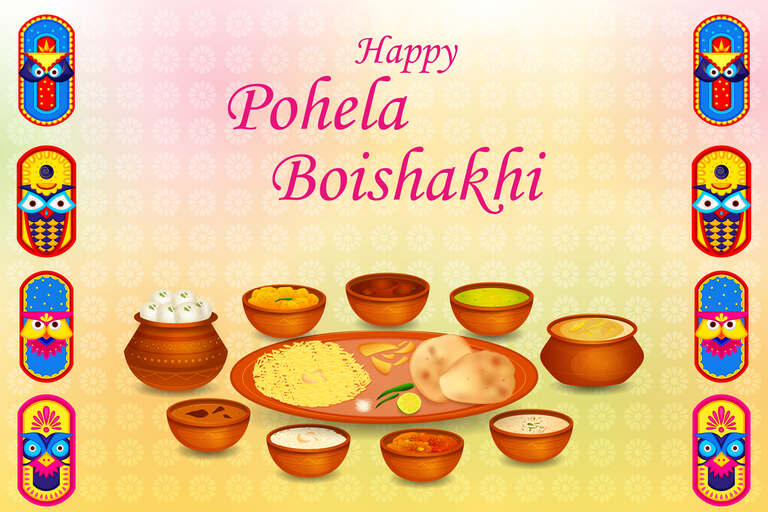
Pohela Boishakh is the Bengali New Year which is celebrated with great enthusiasm and cultural splendor by Bengalis all around the world. This marks the beginning of the Bengali calendar year and the arrival of spring. Pohela Boishakh is deeply rooted in centuries-old traditions. It is a time for renewal, reflection and vibrant festivities that unite communities in a spirit of unity and solidarity.
Origins and Significance of Pohela Boishakh
The origins of Pohela Boishakh can be traced back to the Mughal era in the Indian subcontinent. During the reign of Emperor Akbar in the 16th century, the Bengali calendar, known as the “Bangla San,” was introduced to streamline tax collection and agricultural planning. Bengali Noboborsho emerged as the first day of the Bengali calendar, marking the beginning of the agricultural season and the onset of harvest festivals.
Pohela Boishakh holds profound cultural and religious significance for Bengalis of all backgrounds. It is a time to bid farewell to the old year’s trials and tribulations and embrace the promise of new beginnings. The festival symbolises the triumph of hope over despair, light over darkness, and the eternal cycle of life’s renewal. It is celebrated with fervent devotion and an unwavering commitment to preserving Bengali heritage and identity.
Preparations and Traditions Observed in Pohela Boishakh
The weeks leading up to Pohela Boishakh are a flurry of activity as communities prepare for the festivities. Homes are cleaned and decorated with alpana, intricate patterns drawn with rice paste, to welcome prosperity and good fortune. Markets bustle with shoppers eager to purchase new clothes, traditional sweets, and vibrant decorations for the occasion.
The Mangal Shobhajatra is a famous tradition of Pohela Boishakh. It is celebrated in Bangladesh and by Bengali communities around the world. The procession is led by students and community leaders. It features colourful floats, banners, and cultural performances that celebrate unity, diversity, and resilience. The Mangal Shobhajatra is a symbol of hope and solidarity for the Bengali people and represents their desire for a brighter and more inclusive future.
Celebrations and Festivities of Naba Barsha
People rise early in the morning of Pohela Boishakh to celebrate the New Year with prayers, music, and traditional rituals. The day begins with the ritualistic cleansing of statues of deities in rivers or ponds, symbolising purification and renewal. People dress in traditional attire, with women wearing white saris with red borders and men dressed in panjabis or kurta pyjamas.
Communities celebrate Pohela Boishakh throughout the day with music, dance, and delicious food. Public squares and street corners transform into vibrant fairgrounds, bustling with activity as performers entertain crowds with folk songs, dances, and theatrical performances. Food stalls offer a tantalising array of Bengali delicacies, including petha (rice cakes), doi (yogurt), and panta bhat (fermented rice), inviting revellers to indulge in the flavours of tradition and heritage.
The highlight of Pohela Boishakh celebrations is the traditional Bengali New Year’s feast, known as “Noboborsho Bhuri Bhoj.” Families and friends gather to share a sumptuous meal featuring various traditional dishes, including bhuna khichuri (spiced rice and lentils), fried fish, and chingri malai curry (prawn curry). The feast symbolises abundance, generosity, and the joy of communal sharing, reflecting the essence of Bengali hospitality and warmth.
How is Pohela Boishakh celebrated?
Pohela Boishakh, the Bangla Happy New Year, is a vibrant and joyous celebration that offers many activities and traditions to partake in. Whether you’re in West Bengal or anywhere else in the world, there are various ways to immerse yourself in the festive spirit of Pohela Boishakh.
1. Attend the Mangal Shobhajatra
The Mangal Shobhajatra is a vibrant procession that takes place during Pohela Boishakh. It is a beautiful representation of unity, resilience, and cultural pride. Over time, it has grown to become a symbol of hope and solidarity, attracting participants from diverse backgrounds. The procession is led by students, artists, and community leaders, and it features elaborate floats, colourful banners, and captivating performances highlighting Bengali heritage and traditions.
Symbolising the triumph of light over darkness, the Mangal Shobhajatra embodies the collective aspirations of the Bengali people for a brighter, more inclusive future. Through its message of unity and resilience, the Mangal Shobhajatra is a powerful reminder of the Bengali community’s enduring spirit and cultural richness.
2. Dress in Traditional Attire
Embrace the spirit of Pohela Boishakh by dressing in traditional Bengali attire. Women typically don white saris with red borders, known as “Laal Paar Sari,” adorned with intricate embroidery, zari work, or Kantha stitching. The red and white colours symbolise purity, strength, and prosperity. To complement the sari, women often wear traditional jewellery such as gold necklaces, earrings, and bangles, adding a touch of elegance and grace to their ensemble.
Conversely, men opt for panjabis or kurta pyjamas in vibrant colours and intricate designs paired with traditional headgear like the “Topor” or “Fotua.” Dressed in their finest attire, Bengalis celebrate Pohela Boishakh, embracing their cultural roots and heritage with pride and reverence.
3. Decorate Your Home
Decorating one’s home during Pohela Boishakh, the Bengali New Year, is a beloved tradition that represents rejuvenation, prosperity, and happiness. Families take immense care to embellish their homes with vibrant decorations, intricate alpana patterns, and lively motifs that exude the essence of the festival. Alpana, which is made using rice paste, is meticulously applied to floors and walls in elaborate designs inspired by nature, folklore, and cultural symbols.
These beautiful designs add visual appeal and invite blessings and good fortune into the home. Additionally, households hang colourful banners, streamers, and artwork featuring images of flowers, birds, and traditional motifs to create a festive atmosphere. Together, these decorations transform the home into a welcoming haven, where loved ones gather to celebrate the dawn of a new year with warmth, love, and togetherness.
4. Enjoy Traditional Music and Dance
Traditional music and dance play a central role in the festivities of Pohela Boishakh. It infuses the celebration with rhythm, melody, and joy. Throughout the day, communities come alive with the sounds of traditional folk songs, known as “Baul Sangeet,” “Bhatiali,” and “Lalon Geeti,” that echo through the streets and public squares. Accompanied by instruments like the dotara, ektara, and dhol, these soulful melodies celebrate the beauty of nature, love, and the human experience.
In addition to folk songs, the performances of Rabindra Sangeet the musical compositions of Rabindranath Tagore, add a touch of elegance and sophistication to the festivities. Meanwhile, energetic dances like the Jatra, Dhunuchi Naach, and Chhau dance captivate audiences with intricate footwork, graceful movements, and vibrant costumes. Together, traditional music and dance create an immersive cultural experience that celebrates the spirit of Bengali heritage and unity during the Bengali New Year.
5. Indulge in Delicious Food
Traditional food holds a special place in the celebration of Bengali Noboborsho. Families and communities come together to indulge in a sumptuous feast that showcases the richness of Bengali cuisine. The menu for Pohela Boishakh typically features an array of mouthwatering dishes that tantalise the taste buds and delight the senses. From classic favourites like panta bhat served with fried fish, pickles, and green chillies to hearty servings of bhuna khichuri paired with flavorful curries and chutneys, the feast is a celebration of flavours, textures, and aromas.
Seafood lovers rejoice in dishes like ilish bhapa (steamed hilsa fish) and chingri malai curry (prawn curry), while dessert enthusiasts can indulge in sweet treats like mishti doi (sweet yoghurt), roshogolla, and sandesh. Pohela Boishakh is not only a time for culinary indulgence but also a celebration of tradition, community, and the joys of sharing delicious food with loved ones.
6. Exchange Greetings and Gifts
The exchange of greetings and gifts is a cherished tradition during Pohela Boishakh. It symbolises warmth, affection, and goodwill among friends, family, and neighbours. As the new year dawns, people extend heartfelt greetings and best wishes to one another, expressing hopes for prosperity, happiness, and success in the year ahead. This exchange of greetings fosters a sense of camaraderie and strengthens social bonds, bringing communities closer together in celebration and unity.
In addition to verbal greetings, people often exchange gifts as tokens of love and appreciation, selecting thoughtful presents such as sweets, fruits, flowers, or traditional handicrafts. Giving and receiving gifts during Naba Barsha is not merely a gesture of generosity but also a symbol of gratitude and friendship, enriching the spirit of the festive season with joy and generosity.
7. Attend Cultural Events and Fairs
Attending cultural events and fairs during Pohela Boishakh offers a delightful opportunity to immerse oneself in the vibrant tapestry of Bengali culture, arts, and traditions. Communities organise many cultural programmes, exhibitions, and fairs showcasing the richness and diversity of Bengali heritage. From traditional music and dance performances to art exhibitions, craft displays, and culinary showcases, these events provide artists, artisans, and performers a platform to share their talents and creations with the wider community.
Visitors can explore local markets adorned with colourful stalls selling handcrafted textiles, pottery, jewellery, and artwork, offering a glimpse into the ingenuity and craftsmanship of Bengali artisans. Whether attending live performances, admiring works of art, or sampling delicious Bengali cuisine, cultural events and fairs during Pohela Boishakh captivate the senses and celebrate the essence of Bengali identity and creativity.
8. Participate in Community Service
Participating in community service during Pohela Boishakh embodies the spirit of compassion, kindness, and social responsibility ingrained in Bengali culture. As the New Year dawns, many individuals and organisations come together to organise charitable initiatives, volunteer activities, and community service projects. These are aimed at uplifting underprivileged individuals and marginalised communities.
From distributing food and clothing to organising health camps, educational programmes, and environmental clean-up drives, community service endeavours during Pohela Boishakh extend a helping hand to those in need, spreading joy, hope, and solidarity. Engaging in acts of service not only strengthens the bonds of community and fosters a sense of unity but also reflects the core values of empathy, generosity, and collective responsibility that define the spirit of Pohela Boishakh celebrations.
9. Reflect and Set Intentions
Take some time to reflect on the past year, express gratitude for the blessings received, and set intentions for the year ahead. Engage in meditation, prayer, or spiritual practices that resonate with you, focusing on self-reflection, personal growth, and fostering positive energy and intentions for the New Year.
Pohela Boishakh is more than just a New Year celebration; it is a testament to Bengali’s resilience, vibrancy, and cultural richness. It is a time to reflect on the past, celebrate the present, and embrace the future with hope and optimism. Pohela Boishakh serves as a reminder of the enduring power of culture, tradition, and community in shaping our collective identity and shared humanity. It is a time to embrace joy, renewal, and togetherness with loved ones and the larger Bengali community.
Discover the enchanting charm of West Bengal tourism as you celebrate Pohela Boishakh amidst the warmth and hospitality of Bengali culture. Let SOTC guide you to explore the vibrant markets, indulge in delectable Bengali cuisine, and witness the joyous festivities that mark the Bengali New Year.
Book your Pohela Boishakh adventure today and create unforgettable memories in the cultural heartland of West Bengal. Don’t miss out on the opportunity to experience the magic of Pohela Boishakh with exclusive West Bengal tour packages !
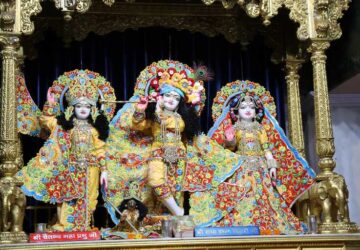
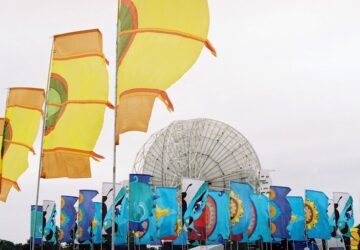
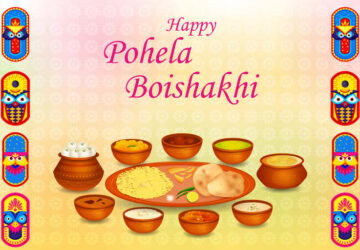
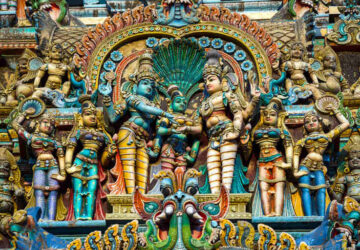
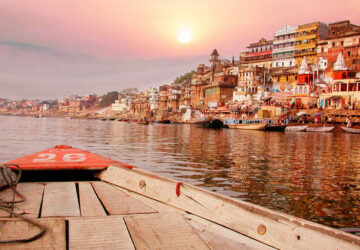
Related Post
Krishna Janmashtami: How Whole India Celebrates Krishna's Birthday in Unique Ways
Mopin Festival: Revelry and Tradition in the Hills
Chithirai Festival: A Spectacle of Tradition and Culture
Explore the Famous Ghats of Varanasi
Konkan Coastal Paradise: A Guide to the Top 10 Beaches You Can't Miss
Ayodhya Tour Guide- A Comprehensive Guide For Your Next Ayodhya Tour
Top Places to Visit In Somnath
The Importance of Buddha Purnima and Where to Celebrate Lord Buddha's Festival
Ayodhya's Festivals: Celebrations And Traditions
Ayodhya Ram Mandir: History, Architecture and Significance